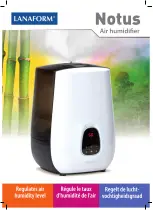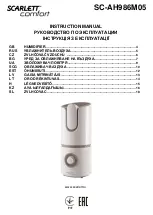
SAFETY PRECAUTIONS
SAFETY PRECAUTIONS
10
GB
14. Decommissioning
Before carrying out this procedure, it is essential that the technician is completely familiar with the equipment and all its detail. It is
recommended good practice that all refrigerants are recovered safely. Prior to the task being carried out, an oil and refrigerant sample
shall be taken in case analysis is required prior to re-use of reclaimed refrigerant. It is essential that electrical power is available before
the task is commenced.
a) Become familiar with the equipment and its operation.
b) Isolate system electrically.
c) Before attempting the procedure ensure that:
Mechanical handling equipment is available, if required, for handling refrigerant cylinders; All personal protective equipment is available
and being used correctly;
The recovery process is supervised at all times by a competent person;
Recovery equipment and cylinders conform to the appropriate standards.
d) Pump down refrigerant system, if possible.
e) If a vacuum is not possible, make a manifold so that refrigerant can be removed from various parts of the system.
f) Make sure that cylinder is situated on the scales before recovery takes place.
g) Start the recovery machine and operate in accordance with manufacturer’s instructions.
h) Do not overfill cylinders. (No more than 80 % volume liquid charge).
i) Do not exceed the maximum working pressure of the cylinder, even temporarily.
j) When the cylinders have been filled correctly and the process completed, make sure that the cylinders and the equipment are
removed from site promptly and all isolation valves on the equipment are closed off.
k) Recovered refrigerant shall not be charged into another refrigeration system unless it has been cleaned and checked.
15. Labelling
Equipment shall be labelled stating that it has been de-commissioned and emptied of refrigerant. The label shall be dated and signed.
Ensure that there are labels on the equipment stating the equipment contains flammable refrigerant.
16. Recovery
When removing refrigerant from a system, either for servicing or decommissioning, it is recommended good practice that all
refrigerants are removed safely.
When transferring refrigerant into cylinders, ensure that only appropriate refrigerant recovery cylinders are employed. Ensure that the
correct number of cylinders for holding the total system charge is available. All cylinders to be used are designated for the recovered
refrigerant and labelled for that refrigerant (i.e. special cylinders for the recovery of refrigerant). Cylinders shall be complete with
pressure relief valve and associated shut-off valves in good working order. Empty recovery cylinders are evacuated and, if possible,
cooled before recovery occurs.
The recovery equipment shall be in good working order with a set of instructions concerning the equipment that is at hand and shall be
suitable for the recovery of flammable refrigerants.
In addition, a set of calibrated weighing scales shall be available and in good working order. Hoses shall be complete with leak-free
Summary of Contents for CD-7QF2 20
Page 1: ...DEHUMIDIFIER OWNER S MANUAL CDF2 16Q7 CD 7 Q F2 20...
Page 23: ...BG...
Page 24: ...1 2 2 4 R290 R32 5 11 12 15 16 16 17 18 20...
Page 25: ...2 BG...
Page 26: ...3 8...
Page 27: ...4 BG 1 PCB T3 15 250V 350V...
Page 28: ...5 CO2 R290 R32 4 2 R32 R290 R32 R290...
Page 29: ...6 BG R290 R32 1 2 3 4 5 6 1 2 3 4 5 C02...
Page 30: ...7 6 7 8 9 7 1 2...
Page 31: ...8 BG 8 9 10 11 25 OFN 12...
Page 32: ...9 13 14 80 15...
Page 33: ...10 BG 16...
Page 34: ...11 1 1 2 MODE 3 LED AP 8 8 3 35 85 5 0 0 24 3 10 4 5 3 LED SC 5 3 LED SC 5...
Page 35: ...12 BG 30 3 3 3 6 HEPA 3 3 7 35 85 0 24 5 30 90 3 AS ES E4 P2...
Page 36: ...13 45 55 3 4 3 3 15 bacteral HEPA A...
Page 37: ...14 BG Time Off 0 5 10 1 24 5 0 0 LED P2 30 50 30 50 A 30 50cm...
Page 38: ...15 1 2 3 4 5 5 4 1 2 3 2 1 2 3 4 5 6 B 7 1 2 3 5 4 6 7 3 B...
Page 39: ...16 BG 20 5 C 41 F 5 C 41 F 40 20 20 20 4 20 24 5 C 41 F 32 C 90 F 30 80...
Page 40: ...17 1 Full P2 1 5 2 6 3...
Page 41: ...18 BG 2 13 5 7 1 2 7...
Page 42: ...19 3 10 10 8 9 10 4...
Page 43: ...20 BG 5 C 41 F ES AS E4 P2...
Page 86: ...EL...
Page 87: ...1 2 2 4 R290 R32 5 11 12 15 16 16 17 18 20...
Page 88: ...2 EL...
Page 89: ...3 8...
Page 90: ...4 EL 1 o T 3 15A 250V or 350V...
Page 91: ...5 C 2 R290 R32 4 R32 R290 R32 R290...
Page 92: ...6 EL R290 R32 1 2 3 4 5 6 1 2 3 4 5...
Page 93: ...7 C02 6 7 8 9 7 1...
Page 94: ...8 EL 2 8 9 10 11 25 12...
Page 95: ...9 13 14 80...
Page 96: ...10 EL k 15 16...
Page 97: ...11 1 1 2 MODE 3 LED AP router 8 8 3 35 85 5 0 0 24 3 10 4 5 3 3 funtion LED SC 5 3 LED SC 5...
Page 99: ...13 45 55 3 4 3 MODE Turbo 3 15 High Efficiency Particulate Air HEPA A Hepa...
Page 101: ...15 1 2 2 3 4 5 5 4 1 2 3 2 1 2 3 4 5 6 7 4 5 1 2 3 6 3 B Hepa...
Page 102: ...16 EL 20 5 C 41 F 5 C 41 F 40 20 20 20 4 20 4 24 5 C 41 F 32 C 90 F 30 and 80 3...
Page 103: ...17 1 P2 1 5 2 6 3...
Page 104: ...18 EL 2 13 5 7 1 2 7...
Page 105: ...19 3 8 10 8 9 10 4...
Page 106: ...20 EL 5 C 41 F ES AS E4 P2...













































